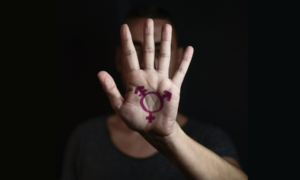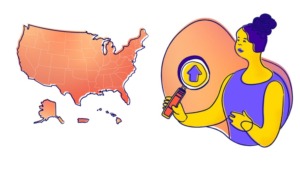LA Youth, Los Angeles
At my school, the majority of the black students hang out at the table at the center of the lunch area. This is where you find the cutest guys and everyone at the table is popular. When I started high school I figured that hanging out there would be the best way to meet everybody.
I spent eighth grade at a small private school. There were only eight black students out of more than 200 in seventh and eighth grades combined. Still, I never felt out of place at school. Everybody hung out with everybody. I had a couple black friends, and also friends who were Egyptian, Hispanic and white. It was cool to have friends of different backgrounds.
But my cousin, who had only black friends, always told me that I needed to hang around more black people. She never gave a reason why – to her it was just something I was supposed to do. “Maybe she’s right,” I thought. I’d heard it from other people in my family.
I wasn’t going to change my middle school friends, but I was ready to try socializing with black people when I had the chance.
When I started high school, I decided to hang out with people who I thought I could relate to the most – the people at “the black table.” The school’s population is mostly Hispanic. I thought that I’d be more comfortable with the other black students, because I’m black.
At first, everyone was really nice. Once second semester started, though, I noticed that the people at the table spent a lot of their time trash-talking others walking by – making fun of their clothes, their hair, their families, anything. When this happened, I would get up and pretend I had to go get something from a teacher.
But the worst thing happened at the end of freshman year. I was telling a friend about this guy I had a crush on. I told her, “Oh my gawd, dude! He is soooo freaking cute, man.”
A girl standing nearby overheard my conversation and interrupted me: “You’re black. It’s ‘n-gga,’ not ‘dude.’ Quit being so #^$%# white!”
I didn’t know what to say. I was upset that a stranger had spoken that way to me, but what was I going to do? Lash out at her for telling me I’m too white, when even members of my family had said that before? So I did the only thing I knew how to do. I just didn’t think about it, even though it hurt. A lot.
Sophomore year, I continued being the target of their jokes. I would get laughed at for using “like” a lot or for using a bigger word in place of a simpler one.
After about a month of this, I felt like I had to get out of there. I had hardly anything in common with them. One time I showed my friend a picture of this white guy I was talking to.
“Britawnya, eww,” she said. “He’s white. What is wrong with you!?”
It hurt a lot that a good friend of mine had a problem with a guy I liked just because of his skin color. But if I ever said that a black guy was cute, they’d say, “Britawnya, no. Just no. He’s not going to want your white butt.”
I couldn’t win. If these people were supposed to be my friends, then why did I feel so alone?
I continued to hang out at the table because I was afraid that if I left, they would talk about me the way they had talked about others. But things got worse. They made fun of me for trying to get help with homework, or for having a Rolling Stones ringtone on my phone. When they wouldn’t stop calling me “the white girl” even after I pleaded with them, I knew I had to leave the table.
I decided to spend some time hanging out with my two best friends, Kirstin and Vanessa. Kirstin is white, and Vanessa is Hispanic. I told a girl at the black table that I was moving to a new table.
“Oh, now you gonna go hang out with your white friends?” she said.
“My white friends?” I replied. “Race is only skin deep, and I choose to hang out with them for who they are, not what they are.” I took a sharp turn and walked away, my head held high. They snickered as I walked away. A few minutes later, a lot of the girls from the table came over.
“What’s your problem?” one of the girls asked.
“Nothing” I said. I was so nervous. There were 20-plus eyes staring me down.
“Then what was that about?” she asked.
“I just didn’t appreciate what she said.”
“So, what’s the big deal?” she said. “They are white.”
I just shrugged my shoulders and turned away. There was no point arguing with her. I realized that the table was no place for me. Their ignorance showed me that I had absolutely nothing in common with them, and it was time for me to leave. I haven’t eaten there since.
I learned that people are going to talk, no matter what. I understand that there are some people I won’t naturally connect with. But I would never judge them, because I would never want someone to judge me.
I know who I am and I know that being black doesn’t mean that I have to act a certain way. My friends taught me that I would rather be hated for who I am, rather than loved for who I am not.
© 2009 L.A. Youth, the newspaper by and for Los Angeles teens, http://www.layouth.com.





























